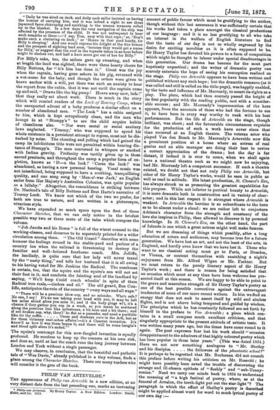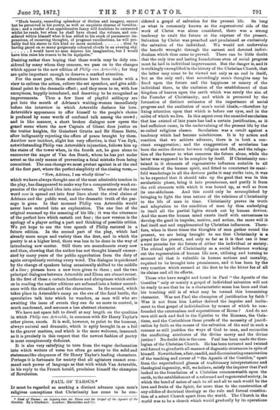PHILIP VAN ARTEVELDE.* THE appearance of Philip van Artcrelde in
a new edition, at no very distant date from the last preceding one, marks an increasing
• Philip ems Artevelde. By Henry Taylor. A New Edition. London: Smith, Elder, and Co. 1872. amount of public favour which must be gratifying to the author, though without this last assurance it was sufficiently certain that his works had taken a place amongst the classical productions of our language : and it is no less gratifying to all who take an interest in the welfare of English literature to find that the taste of our day is not so wholly engrossed by the desire for exciting novelties as it is often supposed to be. Sir Henry Taylor has devoted his powers to a form of composition which might be thought to labour under special disadvantages in this generation. Our drama has become for the most part hopelessly unpoetical ; and the writer of dramatic poetry can scarcely entertain the hope of seeing his conception realized on the stage. Philip van Arty aside appears to have been written and published without any such hope ; but the dramatic romance (as it was called and still is called on the title-page), was happily enabled, by the taste and influence of Mr. Macready, to assert its rights as a play. The piece, which had then scarcely passed the height of its first popularity with the reading public, met with a consider- able success ; and Mr. Alacready's impersonation of the hero appears, from the accounts of those who had the fortune to see it, to have been in every way worthy to rank with his best performances. But the life of Artevelde on the stage, though brilliant, was short ; and the favourable circumstances requisite for the production of such a work have never since that time recurred at an English theatre. The veteran actor who played Van den Bosch to Mr. Macready's Artevelde now fills a prominent position at a house where an actress of real genius and an able manager are doing their best to revive a correct appreciation of the drama ; but the day is far distant, if indeed it is ever to come, when we shall again have a national theatre such as we might now be enjoying, had Mr. Macready left a competent successor. If such a theatre existed, we doubt not that not only Philip van Artevelde, but other of Sir Henry Taylor's works, would be seen in public as well as read in solitude. His latest production, St. Clement's Eve, has always struck us as presenting the greatest capabilities for this purpose. While not inferior in poetical beauty to Artemide, it is more dramatic both in construction and in variety of char- acter; and in this last respect it is strongest where Artevelde is weakest. In Artevelde the heroine is so subordinate to the hero as to be almost under a cloud : we are rather left to conjecture Adriana's character from the strength and constancy of the love she inspires in Philip, than allowed to discover it by personal knowledge. In St. Clenzent's Eve, on the other hand, the part of Iolande is one which a great actress might well make famous.
But we are dreaming of things which possibly, after a long education of actors and audiences, may become true for a future generation. We have lost an art, and not the least of the arts, in England, and hardly even know that we have lost it. Those who want to see classical acting must go to Paris, or Dresden, or Vienna, or content themselves with snatching a night's enjoyment from Mr. Alfred Wigan or Mr. Fechter. But we must return to the purely literary aspect of Sir Henry Taylor's work ; and there is reason for being satisfied that an occasion which must at any time have been welcome has pre- sented itself at this season. We are happy to be able to point to the grave and masculine strength of Sir Henry Taylor's poetry as one of the best possible correctives against the extravagant tendencies of some of our more recent writers. In him we find an energy that does not seek to assert itself by wild and aimless flights, and is not above being tempered and guided by wisdom. The principles which he has constantly followed are set forth by himself in the preface to Van Artevelde; a piece which con- tains in a small compass much excellent criticism, and that singularly appropriate to the present attitude of artistic taste. It was written many years ago, but the times have come round to it again. The poet expresses fear lest his work should "occasion disappointment to the admirers of that highly coloured poetry which has been popular in these later years." (This was dated 1834.) Have we not now something analogous to "Mr. Shelley and his disciples the followers of the phantastic school?" It is perhaps to be regretted that Mr. Buchanan did not consult this preface before writing his criticism on Mr. Rossetti ; he might have possibly been saved the trouble of discovering the strange and ill-chosen epithets of " fleshly " and " sub-Tenny- sonian." Need we carry our minds back to 1834 to understand the meaning of "a high festival of poetry, where, as at the funeral of Arvalon, the torch-light put out the star-light "? The paragraph in which the effect of Shelley's poetry is described might be applied almost word for word to much lyrical poetry of our own day :—
"Much beauty, exceeding splendour of diction and imagery, cannot but be perceived in his poetry, as well as exquisite charms of 'versifica- tion; and a reader of an apprehensive fancy will doubtless be entranced whilst he reads, but when he shall have closed the volume, and con- sidered within himself what it has added to his stock of permanent im- pressions, of recurring thoughts, of pregnant recollections, he will pro- bably find his stores in this kind no more enriched than by having gazed on so many gorgeously coloured clouds in an evening sky.
I would have no man depress his imagination, but I would have him raise his reason to be its equipoise."
Desiring rather than hoping that these words may be duly con- sidered by many whom they concern, we pass on to the changes which appear in the new editiou of Philip van Artevelde; for they
are quite important enough to deserve a marked attention.
For the most part, these alterations have been made with a view to enliven the action, relieve the set speeches, and give addi- tional point to the dramatic effect ; and they seem to us, with few exceptions, happily introduced, and deserving to be recognised as improvements. Thus a few lines of playful soliloquy are put into the month of Adriana's waiting-woman immediately before the interview in which Artevelde declares his love. Artevelde's appearance to offer himself to the people's choice is prefaced by some words of confused talk among the crowd ; and in like manner, a short broken dialogue now opens the grand scene where the new Captain of Ghent does justice on the traitor knights, Sir Guisebert Grutte and Sir Simon Bette, after indignantly rejecting the offers of peace brought by them. Another new incident, slight but very effeetive, is that Van Ryk, notwithstanding Philip van Artevelde's injunction, follows him up the stairs of the tower when, in the fourth act, he goes alone to encounter the anger of Van den Bosch, whom he has put under arrest as the only means of preventing a fatal mistake from being committed. The one change we must protest against is at the end of the first part, where the perfect simplicity of the closing verse,—
" Now, Adriana, I am wholly thine"— which we have always thought one of the most admirable touches in the play, has disappeared to make way for a comparatively weak ex- pansion of the original idea into nine verses. The sense of the one word now is spread out into four lines about the rival claims of
Adriana and the public weal, and the dramatic truth of the pas- sage is gone. In that moment Philip van Artevelde would never have entered into an explanation. The one line of the original summed up the meaning of his life ; it was the utterance of the perfect love which casteth out fear ; the new version is the apology of a player acting a part and thinking of possible critics. We yet hope to see the true speech of Philip restored in a future edition. In the second part of the play, which had already more scope and variety than the first, and in which the poetry is at a higher level, there was less to be done in the way of introducing new matter. Still there are amendments every now and then, showing that the author has not thought himself exoner- ated by many years of the public approbation from the duty of again scrupulously revising every word. The dialogue is quickened by the change of speakers being occasionally shifted to the middle of a line ; phrases have a new turn given to them ; and the two principal dialogues between Artevelde and Elena are almost recast. In the first of these a certain hardness and abruptness which strike us in reading the earlier editions are softened into a better accord- ance with the situation and the characters. In the second, which takes place in Artevelde's camp on the eve of the fatal battle, the speculative talk into which he wanders as men will who are awaiting the issue of events they can do no more to control, is much condensed, and assumes a less abstract character.
We have not space left to dwell at any length on the qualities in which Philip van Artevelde, in common with Sir Henry Taylor's
other pieces, excels. It is well, however, to point to the humour, always natural and dramatic, which is aptly brought in as a foil to the graver matters, and which is the more welcome, inasmuch as it is precisely in this respect that the newest fashion of poetry is most conspicuously deficient.
It is also very satisfying to turn from the vague declamation into which writers of verse too often go astray to the solid and statesmanlike eloquence of Sir Henry Taylor's leading characters. Perhaps it is fortunate for society that all agitators cannot com- mand such power of language as that with which Van Artevelde, in his reply to the French herald, proclaims himself the champion of Revolution.



































 Previous page
Previous page